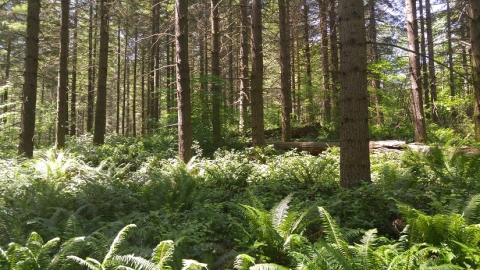Clark County’s Sustainable Forestry Program started in 2011 with the development of forest stewardship plans for recently acquired properties. These plans exemplify how to transition forest land from passive management to active management.
Today, Clark County uses selective thinning and other techniques to improve the overall health of these forest ecosystems, which support a diversity of plants and animals, and to generate a small amount of revenue from wood products.
Clark County developed forest stewardship plans for three county-owned properties – Camp Bonneville, Camp Hope and Green Mountain.
In 2017, the county incorporated these three plans into a single document that also covers other county-owned forest lands: Bratton Canyon, Lake Rosannah and Spud Mountain.
Spud Mountain forest stewardship thinning project begins June 2025
The project includes a timber sale and the removal of selected trees that will be used in habitat restoration projects. Timber thinning operations will occur on county property approximately eight miles north of Camas. All operations will comply with Washington State Forest Practices rules, including requirements for erosion control, wildlife protection, and road use. Hauling will take place via the L-1000S Road and Livingston Mountain Road. No hauling will occur between Nov. 1 and March 31 without additional DNR approval. Learn more.
Camp Bonneville forest management slash burning 2025
As part of our management of the forest at Camp Bonneville, Clark County Public Works will be burning slash piles this spring. Our sustainable timber harvest practices generate woody debris, known as “slash”. Slash contains treetops, limbs and broken pieces. Slash is disposed of to reduce forest fire risk and clear an area for restoration planting. Slash piles are burned when the adjacent forests are moist and fire risk is low. The State Department of Natural Resources (DNR) granted our Sustainably Forestry Program a two-year permit to burn 10 slash piles at Camp Bonneville.
